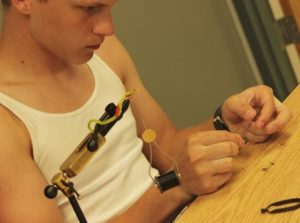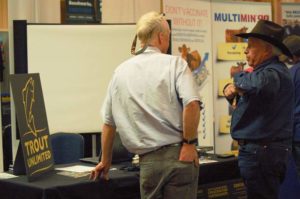Thanks to the great work by Trout Unlimited, partners, and members and supporters throughout the state, the Colorado Water Quality Control Commission (WQCC) rejected the proposed temperature standards from the Water Quality Control Division (WQCD). These changes would have allowed higher elevation streams to reach 63 degrees- 3 degrees over the chronic limit for sensitive coldwater species. For middle elevation streams (the most common streams), the limit would have been raised to 65 degrees, just about the chronic limit for most trout species in Colorado.
The potentially higher temperature standards would have also occurred during the months of April to November- the months of Rainbow and Brown spawning seasons when the fish are more sensitive and susceptible to changes in their environment.
But our fish can chill out.
 Groups all over the state worked together to protect our state's water quality and our trout's quality of life. CTU hired water quality expert, Ashley Rust, as a consultant to provide technical support. Her work demonstrated flaws in the data selection and analysis used for the WQCD’s proposal. TU also worked with Colorado Parks and Wildlife scientists along with other organizations including Sierra Club, Colorado Wildlife Federation, CPW and EPA.
Groups all over the state worked together to protect our state's water quality and our trout's quality of life. CTU hired water quality expert, Ashley Rust, as a consultant to provide technical support. Her work demonstrated flaws in the data selection and analysis used for the WQCD’s proposal. TU also worked with Colorado Parks and Wildlife scientists along with other organizations including Sierra Club, Colorado Wildlife Federation, CPW and EPA.
Typical allies of the Division also helped in the rebuttal of the proposed changes. "I heard a Commissioner express concern with the fact that so many of the Division's traditional allies joined as parties to oppose the Division," said Mely Whiting, TU Counsel. "I don't recall the last time so many organizations participated in a Commission hearing. It makes a huge difference!"
The members of CTU also stepped up big time and sent over 200 emails to the Commission stating their argument against the changes. Along with chapter presidents signing a letter to the commission, members helped collect data through a citizen science campaign as well as offered their own testimonies to the issue from various vantage points.
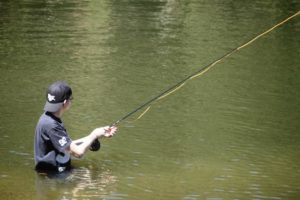 "Big thanks to John Woodling, who's testimony was a turning point in the hearing," said Whiting. "To Robin (Knox) who in 5 minutes conveyed a lifetime of experience- I loved the example of all the poor fish huddling in a small pool in the Yampa to avoid the hot water in response to the Division's callous assertion that if it's too hot, fish can just swim away. Big thanks to Dennis Buechler, who very softly and meekly brought in the impacts of these decisions on small businesses."
"Big thanks to John Woodling, who's testimony was a turning point in the hearing," said Whiting. "To Robin (Knox) who in 5 minutes conveyed a lifetime of experience- I loved the example of all the poor fish huddling in a small pool in the Yampa to avoid the hot water in response to the Division's callous assertion that if it's too hot, fish can just swim away. Big thanks to Dennis Buechler, who very softly and meekly brought in the impacts of these decisions on small businesses."
But the fight for our trout and water quality isn't over yet. The Division will most likely come back next year with changes along the same principal but on a basin-by-basin standard as opposed to the statewide changes proposed this year.
However, with the great work done by TU, partners, and the members throughout the state, we will all be ready to defend Colorado's trout and water moving forward.






 Colorado River float trip: a full day float trip for two on the "lower Upper" Colorado River, above Dotsero. This float trip is with Jack Bombardier and Confluence Casting, who lives alongside the river and loves to share his "home waters" with new and returning visitors. Jack will take you on the Colorado River as it flows through one of the most colorful and beautiful canyons anywhere. On a typical float you might see bighorn sheep, eagles, dinosaur tracks, waterfalls and course lots of feisty trout. Best of all, since this section sees very little river traffic,there a good chance you 'll have it to yourselves! Learn more at the
Colorado River float trip: a full day float trip for two on the "lower Upper" Colorado River, above Dotsero. This float trip is with Jack Bombardier and Confluence Casting, who lives alongside the river and loves to share his "home waters" with new and returning visitors. Jack will take you on the Colorado River as it flows through one of the most colorful and beautiful canyons anywhere. On a typical float you might see bighorn sheep, eagles, dinosaur tracks, waterfalls and course lots of feisty trout. Best of all, since this section sees very little river traffic,there a good chance you 'll have it to yourselves! Learn more at the  Upper Gunnison River walk/wade trip: a full day walk/wade trip for two on public water in the upper Gunnison basin, operating from Three Rivers Resort in Almont with Willowfly Anglers, in the heart of one of Colorado's great fishing meccas picking up world-class angling options with the Gunnison, East, and Taylor Rivers. Operating for over 30 years, Willowfly offers experienced fly fishing guides, excellent private water options (available for an additional fee), as well as a full service fly fishing shop. Willowfly Anglers is the only Orvis Endorsed Outfitter in the Almont area and was recently named one of the top five Orvis Endorsed Outfitters in North America. Learn more at the
Upper Gunnison River walk/wade trip: a full day walk/wade trip for two on public water in the upper Gunnison basin, operating from Three Rivers Resort in Almont with Willowfly Anglers, in the heart of one of Colorado's great fishing meccas picking up world-class angling options with the Gunnison, East, and Taylor Rivers. Operating for over 30 years, Willowfly offers experienced fly fishing guides, excellent private water options (available for an additional fee), as well as a full service fly fishing shop. Willowfly Anglers is the only Orvis Endorsed Outfitter in the Almont area and was recently named one of the top five Orvis Endorsed Outfitters in North America. Learn more at the  Mely Whiting, lead negotiator for Trout Unlimited:
Mely Whiting, lead negotiator for Trout Unlimited: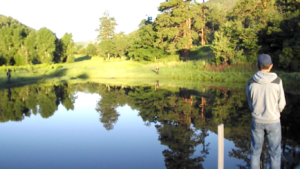 With many fish to be caught and much to be learned, the campers settled in to the barn that they would call home for the coming days. As the week progressed the campers gained experience in the worlds of conservation and fly fishing and made new connections with others who shared similar passions for the outdoors.
With many fish to be caught and much to be learned, the campers settled in to the barn that they would call home for the coming days. As the week progressed the campers gained experience in the worlds of conservation and fly fishing and made new connections with others who shared similar passions for the outdoors.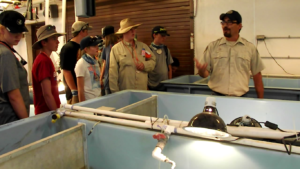 behind genetics, and were able to see what it takes to bring back a species from endangerment. Though the camp focuses on trout conservation, the hatchery harbors nothing but native species (meaning no trout), thus enabling campers to realize that conservation goes further than just the species most popular in Colorado rivers.
behind genetics, and were able to see what it takes to bring back a species from endangerment. Though the camp focuses on trout conservation, the hatchery harbors nothing but native species (meaning no trout), thus enabling campers to realize that conservation goes further than just the species most popular in Colorado rivers.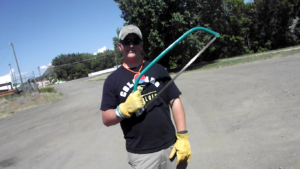 restoration project in collaboration with the Purgatoire River Anglers Chapter of CTU out of Trinidad. The Purgatoire River runs through Trinidad and has seen many restoration efforts in the past few years. Campers assisted in the removal of a fern called Russian olive- an invasive plant that consumes large amounts of water, taking it away from the river system. A day was spent using tools and chainsaws to cut down many of these large plants to better the fishery that the anglers of Trinidad value greatly.
restoration project in collaboration with the Purgatoire River Anglers Chapter of CTU out of Trinidad. The Purgatoire River runs through Trinidad and has seen many restoration efforts in the past few years. Campers assisted in the removal of a fern called Russian olive- an invasive plant that consumes large amounts of water, taking it away from the river system. A day was spent using tools and chainsaws to cut down many of these large plants to better the fishery that the anglers of Trinidad value greatly.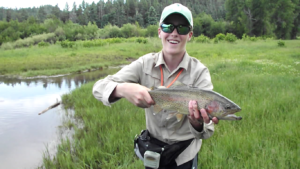 each day, and instruction from experienced guides and fishermen, campers enjoyed testing newly tied flies on eager fish. Astoundingly, at the end of five days, every young angler, regardless of skill level was able to successfully land a fish, with dozens of healthy trout seeing the net.
each day, and instruction from experienced guides and fishermen, campers enjoyed testing newly tied flies on eager fish. Astoundingly, at the end of five days, every young angler, regardless of skill level was able to successfully land a fish, with dozens of healthy trout seeing the net.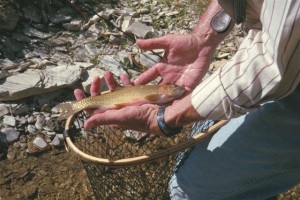
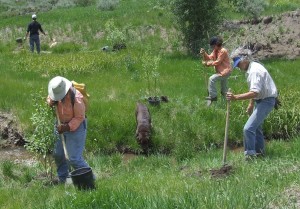
 The water from the Upper Colorado flows from Lake Granby (which acts as the storage facility), then it is is pumped into Shadow Mountain Reservoir where it then flows down into Grand Lake. From Grand Lake, the water then is pumped through the 13.1 mile long Alva B. Adams Tunnel under the Continental Divide and flows into the Big Thompson River. From there, the water drops into power plants that supply the pumps on the western slope.
The water from the Upper Colorado flows from Lake Granby (which acts as the storage facility), then it is is pumped into Shadow Mountain Reservoir where it then flows down into Grand Lake. From Grand Lake, the water then is pumped through the 13.1 mile long Alva B. Adams Tunnel under the Continental Divide and flows into the Big Thompson River. From there, the water drops into power plants that supply the pumps on the western slope.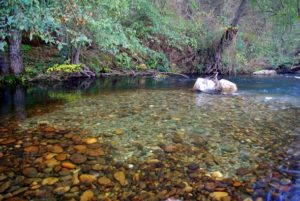 As the flows of the Upper Colorado are depleted by the diversion projects, the natural cleansing of the river fails to occur. Each spring, rivers experience flushing flows- an increase in water flow that breaks up sediment buildup along the stream bed. When the river isn't able to clean itself from sediment buildup between cobblestone, it doesn't allow for insects to hatch or fish to spawn.
As the flows of the Upper Colorado are depleted by the diversion projects, the natural cleansing of the river fails to occur. Each spring, rivers experience flushing flows- an increase in water flow that breaks up sediment buildup along the stream bed. When the river isn't able to clean itself from sediment buildup between cobblestone, it doesn't allow for insects to hatch or fish to spawn. The West needed water to expand. Currently, 80 percent of Colorado's population is on the east of the Divide while 80 percent of the water is on the west side. This means that in order to thrive, water needed to be diverted. The C-BT opened the door to other transmountain diversions- including the Moffat Tunnel from the Fraser River, another tributary of the Upper Colorado headwaters.
The West needed water to expand. Currently, 80 percent of Colorado's population is on the east of the Divide while 80 percent of the water is on the west side. This means that in order to thrive, water needed to be diverted. The C-BT opened the door to other transmountain diversions- including the Moffat Tunnel from the Fraser River, another tributary of the Upper Colorado headwaters.